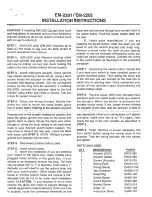
X
With your hand flat, push down active bon-
net
:
in the area around the hinges on both
sides (arrows) until you feel it engage.
If you can raise the active bonnet slightly in the
area around the hinges, it is not engaged cor-
rectly. Repeat the step.
Opening the bonnet
G
WARNING
Certain components in the engine compart-
ment could be very hot, e.g. the engine, the
radiator and parts of the exhaust system.
There is a risk of injury when accessing the
engine compartment.
As far as possible, allow the engine to cool
down and only touch the components descri-
bed in the following.
G
WARNING
When the bonnet is open, and the windscreen
wipers are set in motion, you can be injured by
the wiper linkage. There is a risk of injury.
Always switch off the windscreen wipers and
the ignition before opening the bonnet.
!
Make sure that the windscreen wipers are
not folded away from the windscreen. Other-
wise, you could damage the windscreen wip-
ers or the bonnet.
X
Make sure that the windscreen wipers are
switched off.
X
Pull release lever
:
on the bonnet.
The bonnet is released.
X
Reach into the gap, pull bonnet catch han-
dle
;
up and lift the bonnet.
If you lift the bonnet by approximately 40 cm,
the bonnet is opened and held open automat-
ically by the gas-filled strut.
Closing the bonnet
X
Lower the bonnet and let it fall from a height
of approximately 20 cm.
X
Check that the bonnet has engaged properly.
If the bonnet can be raised slightly, it is not
properly engaged. Open it again and close it
with a little more force.
Radiator
Do not cover up the radiator. Do not use thermal
mats, insect protection covers or anything sim-
ilar. Doing so can cause the Onboard Diagnos-
tics System to display inaccurate values. Some
of these values are legally required and must
always be correct.
322
Engine compartment
Maint
enance
and
care
















































